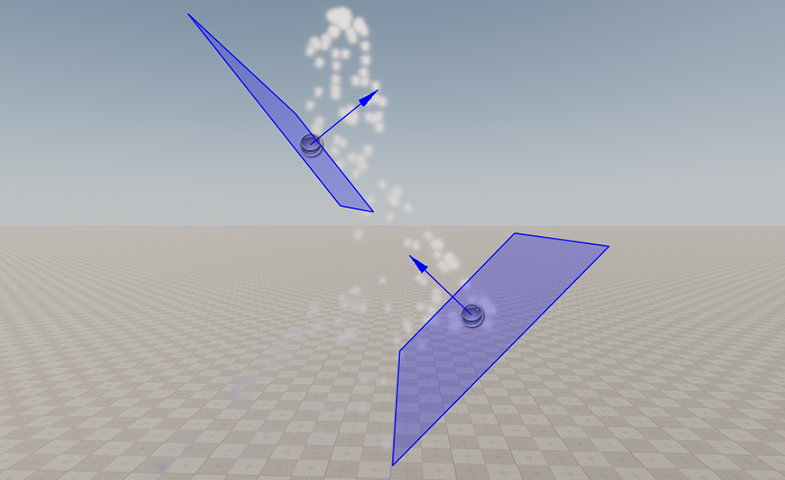Unigine::ParticlesFieldDeflector Class
| Header: | #include <UnigineParticlesFields.h> |
| Inherits from: | ParticlesField |
This class represents a deflector for particles generated by Particle Systems. Deflector is a surface field that has no visual representation, but physically interacts with particle systems (other objects are not affected) blocking the way for particles and making them bounce off the deflector's surface. Depending on the specified size, it can be either rectangular or square, plus it can be arbitrarily positioned or rotated to cover the necessary area.
Deflectors are one-sided, meaning the particles can freely penetrate them through one side, and interact only with the opposite one, for example, when falling on it from above.

ParticlesFieldDeflector Class
Members
ParticlesFieldDeflector ( ) #
Constructor. Creates a new Particles Field Deflector with default parameters.ParticlesFieldDeflector ( const Math::vec2 & size ) #
Constructor. Creates a new Particles Field Deflector of the specified size.Arguments
- const Math::vec2 & size - Size of the Particles Field Deflector along the X and Y axes, in units.
static int type ( ) #
Returns the type of the Particles Field Deflector node.Return value
ParticlesFieldDeflector type identifier.void setSize ( const Math::vec2 & size ) #
Sets a new size of the Particles Field Deflector along the X and Y axes. Deflectors are represented as planes.Arguments
- const Math::vec2 & size - New size of the Particles Field Deflector along the X and Y axes to be set in units.
Math::vec2 getSize ( ) const#
Returns the current size of the Particles Field Deflector along the X and Y axes. Deflectors are represented as planes.Return value
Current size of the Particles Field Deflector along the X and Y axes.void setRoughness ( float roughness ) #
Sets a new roughness coefficient for the Particles Field Deflector. This coefficient defines roughness of the deflector surface the particles collide with, and the range of angles at which particles shall bounce from the deflector.Arguments
- float roughness - New roughness coefficient for the deflector:
- The minimum value of 0 means the surface is smooth and bouncing particles are scattered in a uniform direction.
- The maximum value of 1 means the surface is uneven and bouncing particles are scattered in different directions.
float getRoughness ( ) const#
Returns the current roughness coefficient for the Particles Field Deflector. This coefficient defines roughness of the deflector surface the particles collide with, and the range of angles at which particles shall bounce from the deflector.Return value
Current roughness coefficient of the deflector:- The minimum value of 0 means the surface is smooth and bouncing particles are scattered in a uniform direction.
- The maximum value of 1 means the surface is uneven and bouncing particles are scattered in different directions.
void setRestitution ( float restitution ) #
Sets a new restitution coefficient for the Particles Field Deflector. This coefficient defines the value of the bouncing impulse a particle will receive on a contact with the deflector (how fast a particle shall bounce from the deflector).Arguments
- float restitution - New restitution coefficient for the deflector:
- The minimum value of 0 means the particles do not bounce off, but rather slide along deflector surface.
- The maximum value of 1 makes the angle of bouncing equal to the angle at which the particles fall.
float getRestitution ( ) const#
Returns the current restitution coefficient for the Particles Field Deflector. This coefficient defines the value of the bouncing impulse a particle will receive on a contact with the deflector (how fast a particle shall bounce from the deflector).Return value
Current restitution coefficient of the deflector:- The minimum value of 0 means the particles do not bounce off, but rather slide along deflector surface.
- The maximum value of 1 makes the angle of bouncing equal to the angle at which the particles fall.
The information on this page is valid for UNIGINE 2.19.1 SDK.
Last update:
13.12.2024
Помогите сделать статью лучше
Была ли эта статья полезной?
(или выберите слово/фразу и нажмите Ctrl+Enter